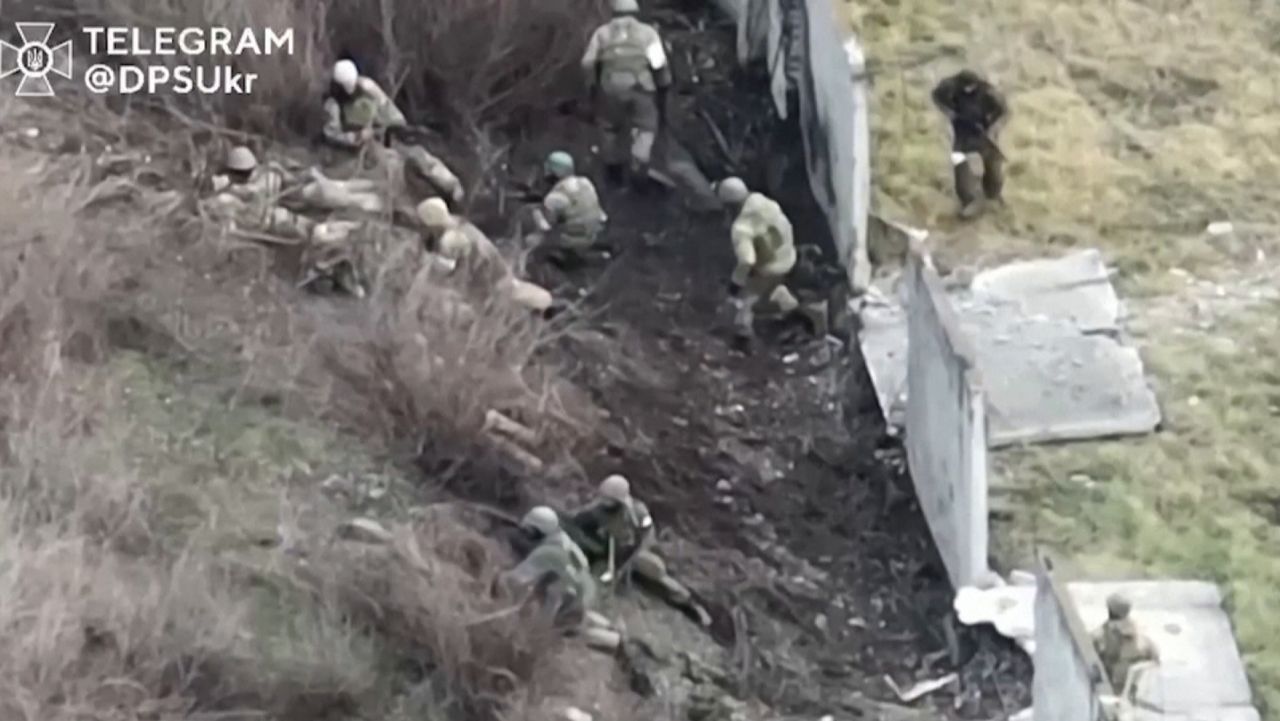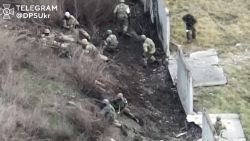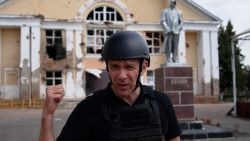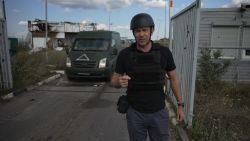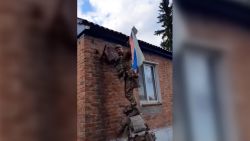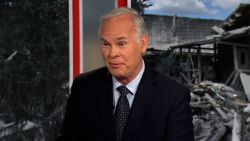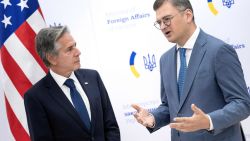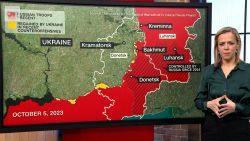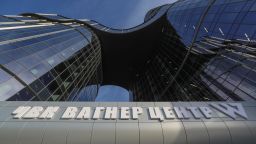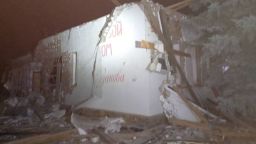Russian oligarch Yevgeny Prigozhin is fighting his own war in eastern Ukraine, an often crude and increasingly vocal presence in Russia’s Moscow’s faltering military campaign.
He is pitching himself and his Wagner mercenary group as the real patriots, in contrast to what he derides as the corrupt and incompetent military hierarchy. The language is getting harsher, and the stakes higher.
In the last few weeks, Prigozhin has been seen close to the frontlines in the occupied eastern region of Donetsk, delivering oranges to the troops or grimly reviewing body bags, and engaging with his fighters in unvarnished and sometimes brutal language.
He rarely misses an opportunity to take a swipe at the establishment. Somewhere in Donetsk last week, Prigozhin told his fighters: “Once we conquer our internal bureaucracy and corruption, then we will conquer the Ukrainians and NATO … The problem now is that the bureaucrats and those engaging in corruption won’t listen to us now because for New Year’s they are all drinking champagne.”
For Prigozhin, the chief bureaucrat that he has in mind is Defense Minister Sergei Shoigu. The two appear to have fallen out over lucrative military contracts given to and then taken from Prigozhin’s Concord Group, as well as Wagner’s controversial role in Syria.

The Ukraine conflict has provided Prigozhin with an opportunity to expand Wagner and proclaim public ownership of the group. Prigozhin said on his Telegram channel last week: “I created and I manage Wagner PMC. Therefore, the responsibility for any successes or failures lies with me.”
After stepping into the limelight in fall of last year, Prigozhin has contrasted his fighters’ raw courage with the uninspiring leadership of Shoigu and the military command. After the debacle in Kharkiv in September, when a rapid Ukrainian counteroffensive forced a Russian retreat, Prigozhin said on his Telegram channel that the high command should be forced to fight “barefoot with machine guns on the front line.”
Shoigu has not been seen at the front and has been widely criticized for the failings of Russia’s so-called “special military operation.” Russian military leaders faced unusually public criticism last week over the deaths of an unknown number of Russian troops in a rocket strike in Makiivka, in eastern Ukraine.
By contrast, Prigozhin has shown a populist flair with his bravado – even taunting Ukrainian President Volodymyr Zelensky when he came to Bakhmut last month.
“Maybe by the evening we’ll be able to meet,” he said on Telegram. “I’m sitting, waiting for you near Bakhmut.”
Prigozhin has also responded to reports that Wagner would be designated a terrorist organization by the US: “As the saying goes, let sleeping dogs lie. Do not wake Wagner PMC, Americans, while it’s still sleeping.”
Off the books
Prigozhin and Wagner have played an unusual and informal role in Vladimir Putin’s Russia. He has known the president since the 1990s; both are from St. Petersburg. He won valuable contracts as the Kremlin’s caterer and later set up the Russian troll farm known as the Internet Research Agency, whose mission was to interfere in the US 2016 election.
But Prigozhin – who reportedly did jail time in the 1980s – has always been the “anti-oligarch,” running his own mercenary operation in Syria and in various African hotspots. Wagner has hired former policemen, soldiers and adventurers and combined training missions in places like the Central African Republic with efforts to win lucrative mineral concessions. For Prigozhin, Wagner is a way to make money and gain influence. For the Kremlin, such operations are a way to get certain things done off the books.
Prigozhin above all is a sharp-eyed opportunist. The Ukraine conflict has given him and Wagner a chance to raise their profile and bring an element to the conflict that the Russian military seems to lack: effective infantry.
Wagner were the first Russian troops into the town of Popasna in the spring and then moved into territory in Donetsk as Ukrainian troops withdrew over the summer to what are their present lines.
The Russian military has been unable to register any territorial gain in the last six months, so for Prigozhin taking Bakhmut or Soledar – two towns in Donetsk that have been under attack for months – would be both a glittering prize and another chance to overshadow Shoigu.

Prigozhin said Friday that it was “exclusively” his troops who have made purported gains around Soledar in recent days. And he added: “Bakhmut is the central point of the Eastern Front and a serious logistics center. And our task is to die there as little as possible, and to destroy the enemy as much as possible.”
In a filmed exchange with his fighters, Prigozhin asked provocatively: “Other than Wagner PMC, who else is here?”
“No one else!” they replied.
On Tuesday, Prigozhin reinforced the point as his fighters appeared to take control of part of Soledar.
“Wagner PMC detachments have taken control of the entire territory of Soledar. The city center is like a cauldron, where urban fighting is taking place,” he said, before adding: “I would like to stress that no units other than Wagner PMC operatives were involved in the storming of Soledar.”
Ukrainian forces continue to deny that Soledar has fallen and even Prigozhin has acknowledged that fighting continues there.
(It may not be coincidental that the Soledar area has huge reserves of gypsum, a mineral used in the production of fertilizer and plaster. Prigozhin’s African adventures have often sought to leverage a military presence for control of mineral wealth, and some Wagner operations in Syria have focused on valuable oil and gas fields.)
Prigozhin’s ambitions have not gone unnoticed in Washington DC. US Deputy Assistant Secretary for Defense Laura Cooper told a briefing Friday: “In the recent past, we’ve seen that Wagner is advancing at a more rapid clip than any other unit in the Russian military.”

‘Their contract is finished’
The Wagner campaign is brutal and basic. Prigozhin and his lieutenants did a trawl of Russian prisons last year with a straightforward offer: fight in Ukraine for six months and get a pardon instead of going back inside. This unusual bargain appears to have the Kremlin’s blessing and added more than 30,000 fighters to Wagner’s ranks, according to prison advocacy groups.
Prigozhin himself addressed a group of prisoners, saying Wagner did not allow alcohol, drugs and “sexual contacts with local women, flora, fauna, men – anything.” In recent days his own media outlet has shown him meeting former prisoners – whose convictions include murder – who say they are “reborn” and have decided to sign up for another six months.
He bid farewell to others who had won their pardon. “They fulfilled their contracts with honor, with dignity,” he said. And then in typically vernacular fashion he told them, “Don’t drink a lot, don’t use drugs, and don’t rape any chicks: either make love or pay for it.”
Prigozhin is not afraid of bad news and he doesn’t sugarcoat the Russian campaign. In a video circulated last week through his own media outlet, FAN, he is seen reviewing black body bags piled up in an undisclosed location.
“They died heroically,” he said. But he also sounded brutally indifferent, adding: “Their contract has finished, they will go home next week.”
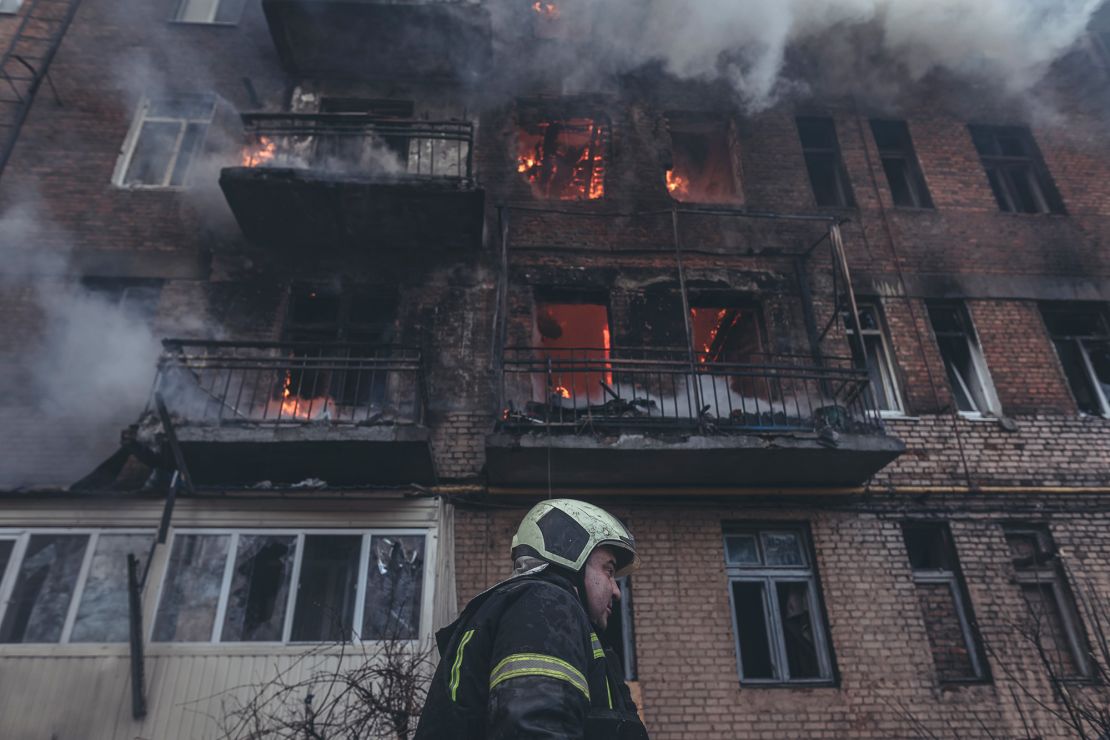
It’s unclear how many Wagner contractors have been killed, but losses certainly run into the hundreds in what the Ukrainians call the “meat-grinder” of Bakhmut.
Surrounded by Wagner fighters, Prigozhin said early this month on Telegram that Ukrainian forces were turning every house into a fortress. “So the guys are fighting for every house … sometimes fighting for weeks for a single house.”
“How many lines of (Ukrainian) defense are there? If we said 500, that would be about accurate, right?” Prigozhin added.
Russian state media has recently begun to cover Prigozhin’s appearances on the front line. State news agency RIA Novosti carried an exchange in which his men say they are short of vehicles, munitions and armored personnel carriers.
Days later, Prigozhin’s Concord Group alleged in a statement that his Patriot media outlet had been asked to publish a negative article about him, while not disclosing who made the request. Through his press service, Prigozhin suggested that “people in uniform could be discrediting me. Chiefly those close to the military. Because many of them can’t achieve the same effectiveness that Wagner has.”
He also took yet another swipe at Russia’s wealthy elite, saying on the Concord Telegram channel: “The oligarchs’ days are numbered anyhow, because their negative impact on the future of Russia has been clearly demonstrated during the special operation. Some of them are at war, while others are buying up real estate in Europe.”
Prigozhin’s very public campaign, set against the Russian military’s lackluster performance, is not a challenge to Putin himself. Indeed, the Russian leader may find it useful to have someone to snap at the heels of the military establishment. Prigozhin, along with Chechen leader Ramzan Kadyrov, has become Russia’s licensed disruptor.
Maxim Trudolyubov of Russia File said “the Russian state does not separate legitimate violence from criminal violence. It’s not a bug but a feature, always present but particularly salient now.”
Trudolyubov tweeted: “Prigozhin is a bogeyman Putin has created to frighten his elites into good behavior. Putin thus advertises his control of both legitimate and criminal violence.”
Analyst Tatiana Stanovaya of R.Politik notes that Prigozhin “is a private businessman who relies heavily on how his relations with the authorities are structured. As a result, it is a very vulnerable position.”
Stanovaya says it’s interesting that the governor of Russia’s Kursk region, Roman Starovoit, has just completed a basic training course with Wagner.
But Prigozhin’s end-game is unclear: whether he is making a pitch for serious political influence or simply advancing Wagner’s sometimes opaque agenda. That may depend on his fighters’ fortunes in the Donetsk region.

Josh Pennington and Darya Tarasova contributed to this report.
